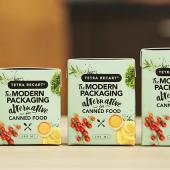Unsustainable sustainability
"Your youngest don’t allow you sleep, the older ones won't even let you rest"... by Stefano Lavorini
 This Yiddish proverb seems perfectly suited when viewing the evolution of the theme of sustainability, particularly in the world of packaging.
This Yiddish proverb seems perfectly suited when viewing the evolution of the theme of sustainability, particularly in the world of packaging.
Let's be clear, «a development capable of ensuring the satisfaction of the needs of the present generation without compromising the possibility of future generations to achieve their own» (*) is a very serious imperative, which cannot be questioned if we want to avoid eternal damnation.
And this is why the concept of sustainability rightfully has a broad meaning, which includes not only the environmental dimension but also the economic and social one.
But precisely because it is so tremendously important, the use and abuse of it, the ignorant or worse, culpable instrumentalization of the matter that is now spreading and that affects both large and small businesses appears less and less tolerable.
It was inevitable that, years ago, in the initial phase of focusing on the problem, of recognition of what had been stubbornly denied up to that point, behaviors and choices of convenience prevailed, which translated into communication strategies aimed at constructing a deceptive image in terms of environmental impact, in order to divert attention from the negative effects on the environment deriving from one's own activities or products.
But today we have had our fill of this practice, of this everlasting greenwashing, which has only become more sophisticated, which hinges on the same old, often blathered out, keywords of an ecological flavor.
Of course it’s all grist to the mill, as they say, and the initiatives that focus on the use of recycled materials or on the installation of photovoltaic roofs, on the use of LED lamps or on the choice of raw materials of vegetable origin, are indeed great; provided however a precise quantification of costs and benefits, without omitting anything, is carried out.
But to starve entire masses of people in order to have bio-based materials that satisfy the expectations of some marketing department, doesn't truly appear to me as sustainable. Likewise, reducing the amount of packaging material cannot represent an advantage, beyond appearances, if the processing waste is increased or, what is even more terrible, if the performance in terms of protection of the organoleptic and health hygienic characteristics of packaged products is affected.
So let's start putting things down clearly: "Let's state the figures" when we talk about sustainability!
The tools have existed for a long time and, to begin with, it would be a good thing not to boast the benefits of a goods item or a service, if not by quantifying the potential impacts on the environment and on human health, with a precise Life-Cycle Assessment (LCA).
In the absence of "culture" and common sense, when we talk about materials, we now tend to embark on a witch-hunt; so, as we know, plastic is the devil incarnate, "the prime origin of Evil", to be banished to the underworld.
Personally I don't agree.
Rather, I am convinced that this pliable, ductile material has become the classic scapegoat that, as we read in the dictionary, "is capable of bearing the evils and faults of the community, which via this process of transfer, is freed from culpability of the same": freeing us from facing up to more complex problems linked to the reality of our national material collection, selection and recycling (and, why not, of waste-to-energy incineration,) systems.
Hence all hail to those who have the courage to speak out, tackling sustainability in a more conscious and sustainable way.
So far responsibilities and deceptions have not been lacking.
On the one hand, a productive world incapable of going beyond the pure logic of profit and, for this reason, forced to chase after events (which are becoming increasingly dramatic) without having the ability to anticipate them; on the other, the belief that everything that "is not" is better, even in the absence of technical and scientific evidence.
Alas, as in other fields, it seems that the important thing is "to simplify", because reasoning is arduous effort that engages knowledge and will.
Seneca, in his dialogue "The happy life", in order to reach this goal, recommends that we first of all clarify the goal, then study the course well, being careful not to listen to the discordant voices that drive in different directions, as the best-known ways are the most deceptive ones: «We must therefore absolutely avoid following - as sheep do - the flock of those who precede us, directing us where everyone goes, instead of where we should go... But since everyone prefers to accept the opinion of others instead of thinking for themselves, even when dealing with one's own life, one merely believes rather than judges».
Ipse dixit: The knowledgeable have spoken.
* RAPPORTO “OUR COMMON FUTURE” published in 1987 by the World Commission for the Environment and Development (Bruntland Commission) of the United Nations Environment Program.




















